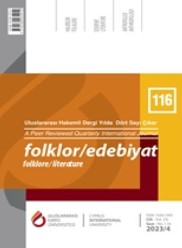Toxic Consciousness in Ian McEwan’s Solar
Toxic Consciousness in Ian McEwan’s Solar
Author(s): Dilek Menteşe KıryamanSubject(s): Human Ecology, Theory of Literature, British Literature
Published by: Uluslararası Kıbrıs Üniversitesi
Keywords: Ian McEwan; Solar; toxic consciousness; climate change; eco-fiction;
Summary/Abstract: Ian McEwan’s Solar (2010) which portrays the story of Michael Beard revolves around Beard’s attempt to actualise his artificial photosynthesis project, which is designed to reduce the impact of global warming. This project, which he plagiarised from a young colleague, is developed to produce solar energy that mimics photosynthesis to decrease the effects of anthropogenic climate change. Yet, Beard, a middle-aged physics professor, believes that environmental problems are exaggerated and, as a result, he rejects the existence of climate change. Rather than taking interest in the eco-friendly aspect of solar energy, he is attracted to the economic profit and academic prestige that he will gain from the solar project. Although McEwan has received much criticism regarding the idea that Solar is not a provocative environmentalist novel as it is not nature-oriented, this article claims that McEwan provides an alternative stance to raise awareness to environmental problems. Beard’s ethics about environmental problems and his false appearance as an environmentalist with a world-saving project initiate a critical conflict that draws attention to the toxic landscape in the novel. Thus, this study discusses that Beard’s actions, thoughts, and objectives reveal the hypocritical discourse of climate change which, as a result, generate a “toxic consciousness” in Solar. “Toxic consciousness” raised by Beard’s anti-heroic qualities foreground the toxic identifications of both nature and culture. In this sense, this study opens a new line of enquiry by arguing that, to develop awareness towards humanity’s waste, Solar demonstrates toxic landscapes and, therefore, represents “toxic consciousness” by means of Beard’s anthropocentric stance.
Journal: Folklor/Edebiyat
- Issue Year: 29/2023
- Issue No: 116
- Page Range: 1231-1246
- Page Count: 16
- Language: English

